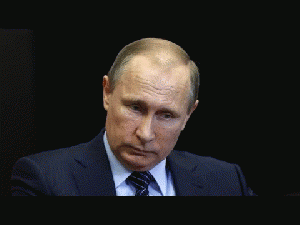Reprinted from Paul Craig Roberts Website
One lesson from military history is that once mobilization for war begins, it takes on a momentum of its own and is uncontrollable.
This might be what is occuring unrecognized before our eyes.
In his September 28 speech at the 70th Anniversity of the United Nations, Russian President Vladimir Putin stated that Russia can no longer tolerate the state of affairs in the world. Two days later at the invitation of the Syrian government Russia began war against ISIS.
Russia was quickly successful in destroying ISIS arms depots and helping the Syrian army to roll back ISIS gains. Russia also destroyed thousands of oil tankers, the contents of which were financing ISIS by transporting stolen Syrian oil to Turkey where it is sold to the family of the current gangster who rules Turkey.
Washington was caught off guard by Russia's decisiveness. Fearful that the quick success of such decisive action by Russia would discourage Washington's NATO vassals from continuing to support Washington's war against Assad and Washington's use of its puppet government in Kiev to pressure Russia, Washington arranged for Turkey to shoot down a Russian fighter-bomber despite the agreement between Russia and NATO that there would be no air-to-air encounters in Russia's area of air operation in Syria.
Although denying all responsibility, Washington used Russia's low key response to the attack, for which Turkey did not apologize, to reassure Europe that Russia is a paper tiger. The Western presstitutes trumpeted: "Russia A Paper Tiger."
The Russian government's low key response to the provocation was used by Washington to reassure Europe that there is no risk in continuing to pressure Russia in the Middle East, Ukraine, Georgia, Montenegro, and elsewhere. Washington's attack on Assad's military is being used to reinforce the belief that is being inculcated in European governments that Russia's responsible behavior to avoid war is a sign of fear and weakness.
It is unclear to what extent the Russian and Chinese governments understand that their independent policies, reaffirmed by the Russian and Chinese presidents on September 28, are regarded by Washington as "existential threats" to US hegemony.
The basis of US foreign policy is the commitment to prevent the rise of powers capable of constraining Washington's unilateral action. The ability of Russia and China to do this makes them both a target.
Washington is not opposed to terrorism. Washington has been purposely creating terrorism for many years. Terrorism is a weapon that Washington intends to use to destabilize Russia and China by exporting it to the Muslim populations in Russia and China.
Washington is using Syria, as it used Ukraine, to demonstrate Russia's impotence to Europe -- and to China, as an impotent Russia is less attractive to China as an ally.
For Russia, responsible response to provocation has become a liability, because it encourages more provocation.
In other words, Washington and the gullibility of its European vassals have put humanity in a very dangerous situation, as the only choices left to Russia and China are to accept American vassalage or to prepare for war.
Putin must be respected for putting more value on human life than do Washington and its European vassals and avoiding military responses to provocations. However, Russia must do something to make the NATO countries aware that there are serious costs of their accommodation of Washington's aggression against Russia. For example, the Russian government could decide that it makes no sense to sell energy to European countries that are in a de facto state of war against Russia. With winter upon us, the Russian government could announce that Russia does not sell energy to NATO member countries. Russia would lose the money, but that is cheaper than losing one's sovereignty or a war.
To end the conflict in Ukraine, or to escalate it to a level beyond Europe's willingness to participate, Russia could accept the requests of the breakaway provinces to be reunited with Russia. For Kiev to continue the conflict, Ukraine would have to attack Russia herself.
(Note: You can view every article as one long page if you sign up as an Advocate Member, or higher).






